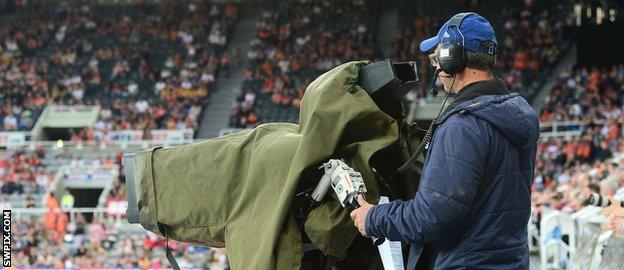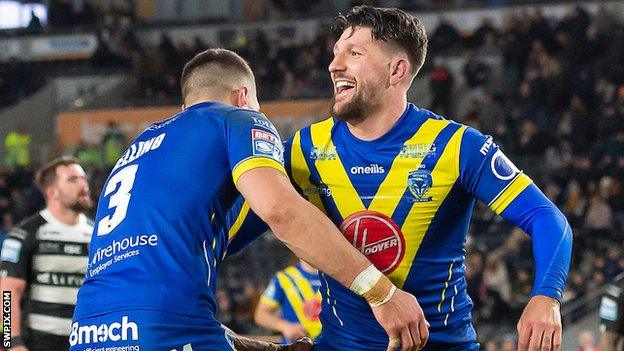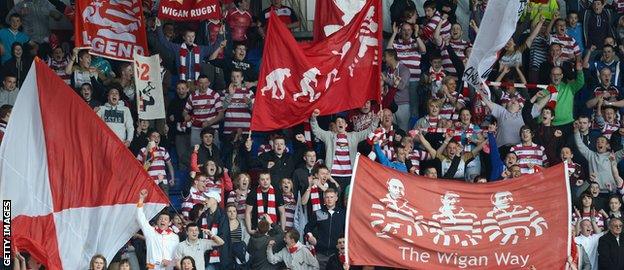Rugby League: What could happen next for Super League and beyond during the coronavirus outbreak?
- Published
'Challenging times ahead' for rugby league - RFL's Mark Foster
These are uncertain times for rugby league.
The global outbreak of coronavirus has forced the game, like almost all sports around the world, to shut down in an attempt to halt the spread.
With it, there is immense pressure on the very future of the game, its clubs and its competitions.
What's the impact on competitions?
Unlike 'winter' sports like football and rugby union, the league season in Europe and Australia - its two biggest competitions - is in its infancy.
While Australia's National Rugby League (NRL) has continued, albeit behind closed doors, the Super League, Championship and Challenge Cup have all been shut down. As it stands there will be no action in those competitions until 3 April.
It is understood there are contingency plans for shorter seasons, all dependent on government advice and guidelines on when it might be safe to return to action.
The issues for Super League and Championship, in particular, are the international presence of clubs - the Toronto Wolfpack in Canada and French clubs Catalans Dragons and Toulouse.
Any compression of the season would need to take into account the travel time of continental sides, in addition to player welfare and the integrity of the competition.
At present, teams play each other home and away and then, to service the terms of the broadcast deal, seven further fixtures are added - known as 'loop fixtures'. This gives the league 'wriggle-room' to some extent, as those games could be scrapped dependent on the return-to-play date.
However, that also means a loss of budgeted revenue for home games.
In the case of the Challenge Cup, there is the issue of a scheduled date for the final at Wembley on Saturday, 18 July.
At present, the season is set to recommence on the weekend of the sixth round, however the feeling is that will be too soon given the current development of coronavirus.
The challenge will be trying to fit all remaining rounds in without affecting the date of the final.
There are also scheduled events such as the Magic Weekend at Newcastle United Football Club's St James' Park, which is usually arranged around the end of the Premier League season and the re-surfacing of the pitch.
Football's own postponement of the season could have a knock-on effect, with their campaign extended to go beyond the usual 1 June cut-off point.
On the international stage, England's lucrative Test series against Australia is also under threat in the autumn, as the Australian Rugby League is expected to move State of Origin - arguably the game's most treasured series of matches - to the end of the campaign to ensure it can be played in front of spectators.
The extension of the season would make a full tour difficult to undertake.
What about broadcast deals?

Super League, the Championships and the Challenge Cup are all postponed until at least 3 April
The leagues, from Super League down to League 1, have their broadcast deals with Sky Sports, while the Challenge Cup is covered by the BBC.
At the moment it is too early to say what impact will be felt from a broadcast perspective, but all parties are in regular dialogue taking into account the latest government advice.
In terms of coverage, it is understood that opportunities are being explored surrounding covering games remotely should the matches be played behind closed doors.
Could Super League lose its big-name players?

Gareth Widdop (right) is among the marquee players in Super League
Money from broadcasters generally covers the £2.1m salary cap which is available to each Super League club, although not every team spends up to the maximum figure.
Many of the English top-flight's biggest stars, such as Warrington halves Blake Austin and Gareth Widdop, Toronto Wolfpack's former New Zealand All Black Sonny Bill Williams and Wigan prop George Burgess, have been signed using the "Marquee Player off-set".
That measure allows clubs to sign high-profile players from the NRL or from rugby union with the incentive of only declaring £150,000 of their salary against their total cap.
Most clubs that have signed marquee players would be best placed to be able to afford to retain them.
The biggest threat for clubs will be staying afloat regardless, and also what impact the lack of cash flow will have on being able to maintain their coaching and off-field infrastructure.
Are clubs resilient enough to survive?
Rugby league clubs are just as exposed to the financial fallout of the pandemic as any business, given the hand-to-mouth nature of the game in Britain.
The sport continued during World War Two for morale purposes, and during the 1984-85 miners' strike - when many communities rooted in rugby league were deeply affected financially - fans in places such as Featherstone were able to attend games on a 'come now, pay later' basis during those cash-strapped times.
This cancellation of the game has only previously taken place in wartime, and that was more than 100 years ago during World War One.
Without cash at the turnstiles, purchase of merchandise and corporate facilities, there is a deficit in many clubs' income that will be difficult to account for.
"Games being played behind closed doors is the worst possible outcome for a number of clubs." Dr Rob Wilson, expert in sports finance and principal lecturer at Sheffield Hallam University told BBC Radio Leeds.
"League One and League Two football clubs are similar to Super League clubs in terms of size, so naturally any of those clubs are going to really find it difficult to tolerate any significant downturn in trade. Again matchday revenue is so important.
"While rugby league sold out to the big broadcasters, if you end up not playing a season you'd expect the broadcasters to say 'we want some of that value back, or, we're not going to pay those ongoing fees because you've not completed your season'.
"The sport will be hoping the game is played. If they don't get the season played or the RFL (the game's governing body, the Rugby Football League) cannot support those teams, then unfortunately the answer as to whether teams will go under is yes."
What are the clubs doing to help alleviate the situation?

Fans are being urged to support their club with membership and merchandise purchases
The close-knit nature of the rugby league set-up means clubs play key roles in the communities of those towns and cities, be it through foundation work or as a point of social contact.
Lisa Nandy, the MP for Wigan, wrote in the New Statesman, external that it is estimated that £4.08 social return is generated for every £1 spent by community rugby league clubs.
Without income coming in, it is harder for those clubs to generate that spin-off.
There has been a drive to get fans to take up memberships, such as Castleford's '1926 Club' venture, by way of generating money in the absence of ticket sales.
Down under, the New Zealand Warriors have taken up a temporary residence in Australia to allow them to fulfil games, and fans have led their own campaign of support by becoming club members.
Teams such as Championship side Halifax have already sought staff, including players, to take a reduced salary during this period to help keep the club afloat.
Super League side Wakefield are yet to ask their players to take a cut, but are exploring all options in their bid to ensure they survive the loss of income.
"I spoke to HMRC about deferring the PAYE payment (the tax paid on salaries), and they were happy to accept that three month deferral on PAYE," Trinity chief executive Michael Carter said.
"We have to do whatever it takes to get this sport through to 30 November this year. If we get this sport through we'll have done an amazing job. I'm talking game-wide.
"First and foremost we're clearly seeking government help in whatever form that will take, the government announcement of grants and loans help to a certain extent.
"Say we start in June and we manage to fit all the games in, our revenue will not be the same as a normal season because people won't be able to afford three home games in a week, they won't afford a replica top on top of two home games.
"Our revenue won't be what we were predicting three or four months back. My primary concern is getting everyone through to the end of November. If we're not together we won't survive."